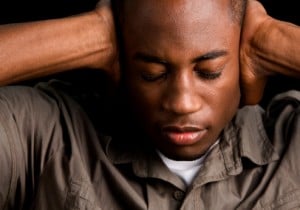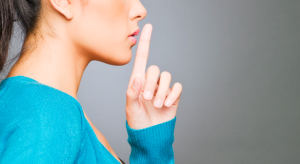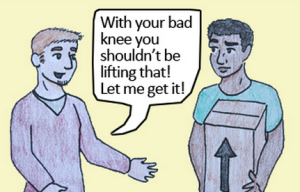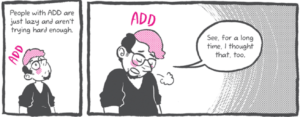
Source: Academy of Learning
I’ve been dealing with anxiety for almost as long as I can remember.
Some of my most vivid childhood memories are of the feelings of panic I felt each day immediately prior to entering school. Without warning or reason, my chest would become heavy and I felt short-of-breath. It felt like everything was out of my control.
I always shrugged it off, assuming it was something everybody dealt with. It wasn’t until I was much older and that I realized I had been struggling with an anxiety disorder for most of my life.
After leaving for college, it only got worse. Far from the safety of my home, family, and friends I was left wondering how I would get through the next few years.
Then I found feminism.
As a first year student, I became involved in my university’s peer sexual health group, which eventually brought me to the Civil Liberties and Public Policies Conference, and in turn feminism. Afterward, everything changed for me.
Feminism has allowed me to foster deep relationships that ground me, given me space to put myself first, provided me with tools to analyze where my stressors are coming from and how to disregard them when they’re actually just harmful side effects of living in an oppressive patriarchal culture.
Feminism taught me about who I am and what I need.
Although I suspect it is always something I will struggle with, I now know I’m not struggling alone. I know that I am capable of working through it, and worthy of taking time for myself and my own mental health when I need it.
Feminism can change your relationship with your anxiety. Here is how it changed mine.
Recognizing Where the Stressors Are Coming From
One of the primary ways that feminism has changed how I interact with my anxiety has been in granting me the ability to recognize that a lot of the stressors that impact me the most are actually stressors put upon women by society to look and act in certain ways.
Some of my biggest stressors have always been about what others think of me: my appearance, my weight, my accomplishments.
Before feminism, this was how I defined myself.
This led me to have dangerous relationships with eating, my body, my self-esteem, and basically everything else in my life as I constantly tried to grasp for control as my anxiety caused my life to feel so out of my hands.
Feminism has taught me that there is often no need for this; that I am more than the sum of my appearance and my work.
The body-positive movement in particular has changed my anxiety by changing my relationship with my body. Many of the deepest and most prominent anxieties I have come from feeling that my body wasn’t good enough because it didn’t look the way the media told me it should.
However, learning about body-positivity has given me the consciousness to recognize that although this is something that causes me great anxiety, in reality, there is nothing wrong with my body. It is beautiful and perfect, just the way it is.
My relationship with my body may always be a work in progress, but now I am able to deal with it in healthier ways. I am able to recognize that the pressure I’ve put on myself in the past to look a certain way is because society told me it was how I was supposed to look, not because there was something wrong with me.
This was one my earliest turning points, but since I’ve come to see my own body in a better light and embraced my body’s inherent worthiness of taking up space, my related anxieties have greatly subsided.
Embracing Relationships with Other Women
As much as I hate to admit it, as a teen I was full of girl-hate.
I uttered the phrase, “I can’t stand most girls” countless times. I had a bad case of the Special Snowflake Syndrome, and I surrounded myself with male friendships.
Although some of my best friends were girls, I cycled through them almost constantly as a teen without a thought.
In retrospect, I realize that this was because society told me that there was something shameful about being a girl and, by proxy, being friends with girls.
Feminism taught me to recognize this and interrogate the reasons why I felt this way.
Now, my friendships with other women have become some of the most important and long-standing relationships in my life. They have helped me to connect with myself and to stay grounded when everything else seems out of control.
My friendships with other women have been my rock, and they have gifted me with the strength to keep fighting when my anxiety tells me I can’t.
Before the wonderful women I’ve come to rely on came into my life, I often felt alone in my struggles. It felt like nobody really understood me or what I faced on a day-to-day basis.
Now, my friendships with other women have shown me that I am not alone. My friends are there to help me carry the burden.
This has been one of the greatest gifts feminism as given me.
Self-Care
Part of dealing with an anxiety disorder is dealing with the fact that it is sometimes difficult just to get through normal day-to-day activities.
Sometimes, even when I know there is no real reason I should be feeling a certain way, I can’t talk myself down from it.
This is really where self-care comes into play for me.
Before I found feminism, when these situations happened I was often left feeling guilty for feeling so out of control. This meant I’d end up trying to push through whatever I was doing until I either burnt out or broke down, often both.
Feminism taught me that not only is this unhealthy and unsustainable, it also does nothing for the greater good. Burning myself out doesn’t help anybody, and quite frankly nobody was asking me to do it.
I felt like it was selfish to take time for myself, but really nothing was further from the truth. It is never selfish to take the time you need simply to keep going.
Self-care also comes into play as a preemptive way to deal with anxiety. It means taking the time to check-in with myself and make sure I’m doing okay, and when I’m not, stepping back.
Self-care is an essential part of ensuring that I’m able to keep doing the work I do, both as an activist and as a person.
Sometimes even the day-to-day occurrences that might not seem stressful to others can trigger something major or build to a breaking point. Learning about self-care taught me that it is okay to step away when this happens, because my own mental health is as worthwhile as anything else I may be doing.
This also meant learning that it is okay to say no when I can’t mentally take writing that extra blog post for an organization whose work I care about, or that it is okay to spend the night in recharging myself even though all of my friends want to go out.
It is okay to put yourself first, because we are all the movement, and we can’t foster its growth without putting the same love and attention we give feminism and social justice work into ourselves.
Finding My Voice
My anxiety works like a broken record in my head. It constantly tells me that nobody wants to listen to what I have to say. It tells me that my thoughts, my words, and my writing are all not good enough. It makes me fear that every word I put out there will ultimately lead me to judgment and negativity.
But seeing myself and my work through a feminist lens has taught me to challenge that.
Feminism amplifies voices that society often silences, and it gave me back a voice that my anxiety had quieted a long time ago.
Feminism has taught me how to stand up for what I believe in. It gave me a safe space to explore my passions, to be listened to, and eventually to pass on what I have learned to others.
It has shown me that what I say matters, and that it can make a difference.
Finding my voice has been the most important part of my journey as a feminist, and it has been what has allowed me to get to the core of my anxiety and combat the thoughts it puts in my head.
***
I may always struggle with the realities of living with anxiety, but feminism has given me both the tools and the strength to deal with it in healthy constructive ways.
It has changed my relationship with my mental health, and it has the power to help you do the same.
[do_widget id=”text-101″]
Ally Boghun is a Contributing Writer at Everyday Feminism. She is a feminist activist and media researcher living and working in Washington, DC. Ally completed both her B.A. in Communications and Art History as well as her M.S. in Professional Communications at Clark University, where she researched abortion debate rhetoric. She is also the founder and editor of Because I am a Woman, a blog devoted to intersectional feminism and reproductive justice. In her spare time, you can find her at an art museum, consuming massive amounts of coffee while writing, or trying to convince her cat to go for walk. You can follow Ally on Twitter @AllyBoguhn. Read her articles here.
Search our 3000+ articles!
Read our articles about:
Our online racial justice training
Used by hundreds of universities, non-profits, and businesses.
Click to learn more




















